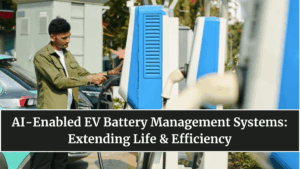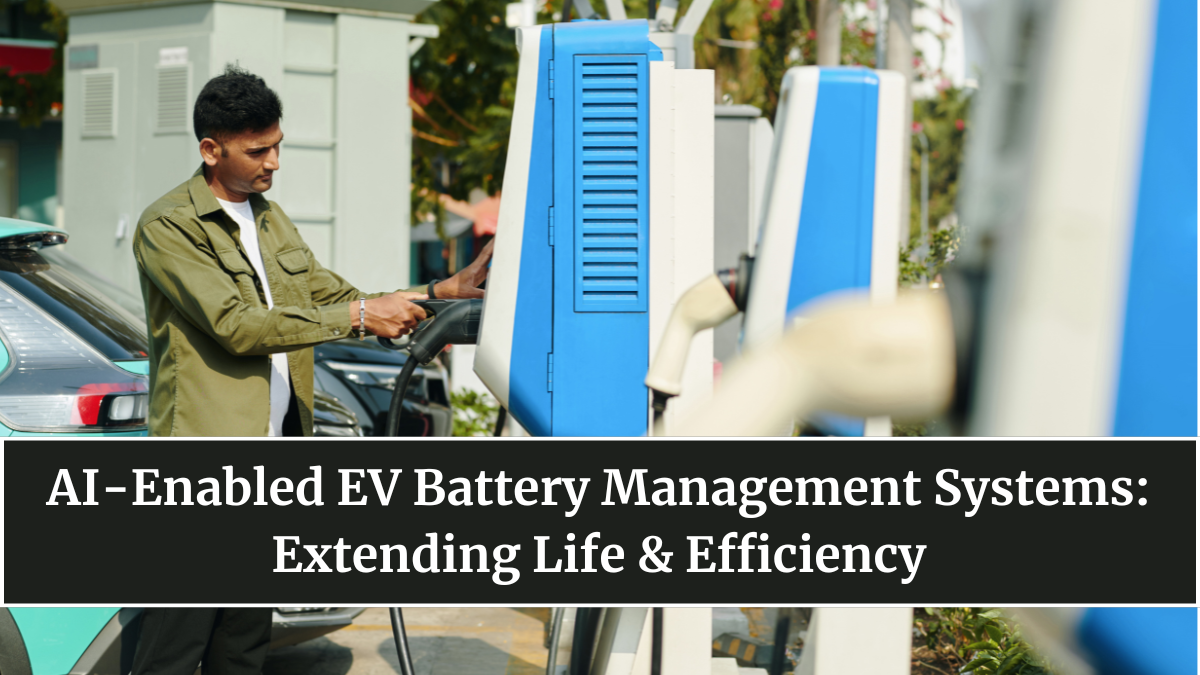In 2025, electric vehicles (EVs) are becoming more intelligent than ever, thanks to AI-powered battery management systems (BMS). These systems are transforming how EV batteries are monitored, charged, and maintained — ultimately increasing range, safety, and performance. As the world races toward full electrification, AI EV battery management has emerged as a key innovation driving the next wave of smart mobility.

What Is an AI-Based Battery Management System?
A Battery Management System (BMS) ensures the safe and efficient operation of EV batteries by monitoring temperature, voltage, and charge levels. When combined with artificial intelligence, it becomes predictive rather than reactive. This means the system can analyze thousands of data points in real-time, predict potential faults, and optimize charging cycles before issues arise.
For example, AI algorithms can forecast cell degradation patterns, balance energy across battery modules, and adapt to a driver’s behavior. This personalized management not only boosts efficiency but also extends the battery’s lifespan by preventing overcharging or deep discharging.
Enhancing Battery Range and Safety
One of the biggest challenges EV owners face is range anxiety — the fear of running out of power mid-journey. AI solves this by continuously learning from driving patterns, road conditions, and weather data to estimate precise range predictions. It can also adjust power delivery dynamically, ensuring optimal energy use under different driving scenarios.
Safety is another major benefit. Traditional systems react only after detecting a fault, but AI-driven BMS predicts anomalies before they escalate. For instance, it can detect a cell’s thermal instability early, preventing risks like overheating or battery fires. This makes the EV ecosystem more reliable and trustworthy for consumers.
How AI Improves Charging Efficiency
Smart charging is one of the most impactful applications of AI in battery management. The system identifies the most efficient charging pattern based on battery health and grid conditions. When connected to renewable energy sources, it can schedule charging during low-demand or high-supply periods — promoting green and cost-effective energy use.
Moreover, AI enables adaptive charging, where charging speed and voltage are automatically adjusted to reduce battery wear. With real-time cloud connectivity, EVs can even locate optimal charging stations and precondition the battery temperature before arrival, improving efficiency and convenience.
Integration with IoT and Cloud Data
The rise of IoT-connected EVs allows AI-based BMS systems to collect and analyze massive amounts of data. By leveraging cloud computing and machine learning models, automakers gain deep insights into long-term battery performance across fleets.
This data helps predict degradation trends, optimize manufacturing processes, and refine energy algorithms over time. Platforms like Tesla’s Neural Network, Rivian’s Cloud Analytics, and Tata Motors’ connected mobility systems showcase how cloud-driven AI is reshaping EV energy intelligence globally.
Sustainability and Second-Life Battery Use
AI doesn’t just improve battery performance — it supports a circular energy economy. When a battery’s capacity drops below automotive standards, AI can identify suitable secondary applications, such as home energy storage or grid balancing. This extends the battery’s useful life and minimizes waste, aligning perfectly with global sustainability goals.
Recycling facilities are also using AI to sort and recover valuable materials like lithium, cobalt, and nickel, making the entire EV lifecycle more efficient and eco-friendly.
The Future of AI in EV Battery Systems
By 2025, nearly every major EV manufacturer is integrating AI-based BMS into their vehicles. The next phase involves self-healing batteries, edge AI chips, and vehicle-to-grid (V2G) communication, enabling EVs to return unused energy to the grid intelligently.
The combination of AI, machine learning, and big data will ensure that EV batteries are not only smarter but also longer-lasting, safer, and more sustainable. The result? A world where electric vehicles don’t just run on clean energy — they think, adapt, and evolve with every charge.
FAQs
What is an AI-enabled Battery Management System?
It’s a system that uses artificial intelligence to monitor, analyze, and optimize an EV’s battery performance, improving safety and extending lifespan.
How does AI improve EV battery life?
AI predicts degradation patterns, optimizes charging cycles, and prevents overcharging or overheating, reducing long-term wear.
Can AI help with EV range anxiety?
Yes, AI systems use predictive algorithms to estimate accurate driving range based on current battery levels, terrain, and traffic conditions.
Are AI battery management systems already in use?
Yes, companies like Tesla, Rivian, Hyundai, and BYD are already using AI-based systems in their 2024–2025 models.
What’s next for AI in EV batteries?
The future includes self-optimizing batteries, predictive maintenance, and V2G energy sharing, making EVs smarter and more sustainable than ever.
Click here to know more.
